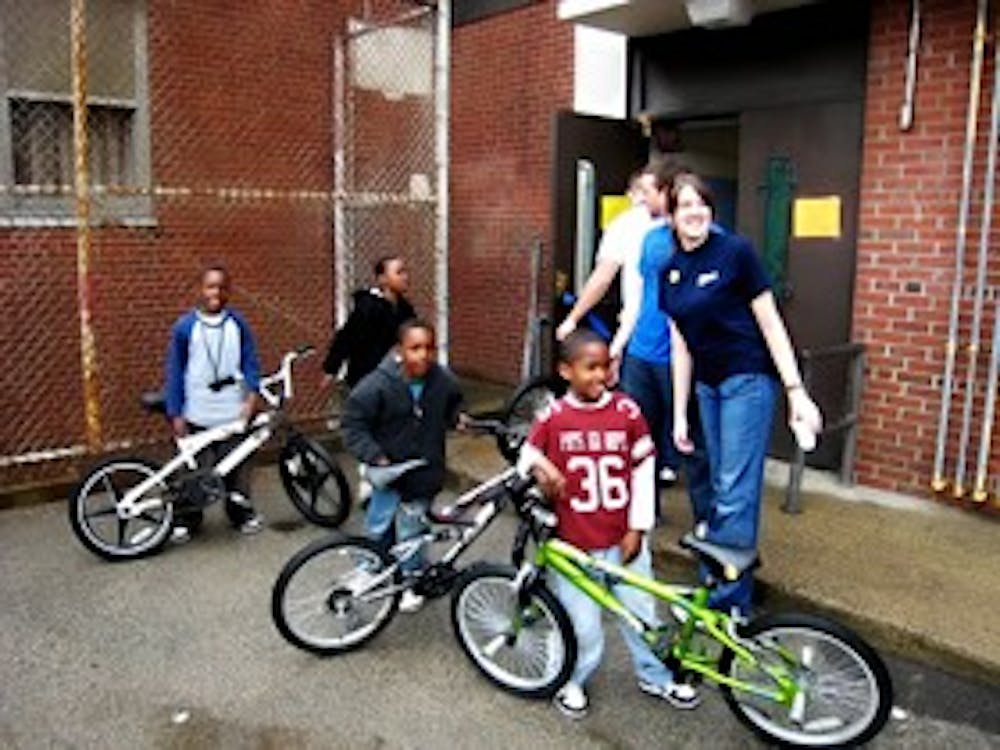Since it first opened to the residents of the East Parkside community in 1994, the United Community Clinic has been striving to serve this West Philadelphia neighborhood.
Every Monday evening, graduate students from the schools of Medicine, Nursing and Social Policy and Practice, along with undergraduate students, operate the free clinic out of the First African Presbyterian Church between 41st and Girard streets from 6 to 9:30 p.m..
The clinic is a “win-win situation for everyone involved,” explained Patrick Georgoff, second-year medical student and hypertension director, because it offers important assistance to patients and crucial learning experience to student volunteers.
UCC has recently expanded its services to address needs exacerbated by unemployment and lack of insurance accompanying the current economic climate — but those same financial woes may be putting the clinic itself in jeopardy.
* * *
With unemployment rates on the rise in recent months, increasing numbers of patients with diverse complaints are frequenting the clinic — the majority of whom are uninsured.
In response, the clinic has broadened its role in the social work arena by helping patients apply to medical assistance and patient assistance programs.
Nursing senior Lori Ingleton explained that one of the primary functions of the clinic was to “connect [patients] with the resources they need.”
Prospective patients sign up for appointments earlier in the day and return to the clinic at 6 p.m. for a “roll call.” Before they are examined, all visitors undergo a consultation with social work students who determine the nature of the services they require.
Undergraduate students take vital signs, blood pressure and physical measurements, and the appointment concludes with an examination of the patient by an attending physician and a medical student.
According to Laura Guggenheimer, social work student coordinator and second-year SP2 student, in the past, most visitors to the clinic only required physicals.
“With budget cuts and funding as they are now, it takes four to six weeks to be seen in the Philadelphia City Health District, where people generally go for free physicals,” she said.
This is especially problematic because people often need physicals to begin jobs. “Four to six weeks is a long time to wait if they’re looking for a paycheck,” she added.
Before, patients were given lists of eligibility requirements and an application, but now clinic volunteers are working with the church to set up computers and work with patients through the process.
As a result, patients can now access the Compass website — the state site for enrollment in medical assistance — and work with SP2 students to fill out the required forms, submit the application and request an interview.
* * *
The clinic is expanding in other ways as well.
This year it began running a monthly ophthalmology clinic in collaboration with the Scheie Eye Institute, providing vision examinations, frames and lenses to patients free of charge.
Last year, after receiving a grant through the division of cardiology at the Hospital of the University of Pennsylvania, UCC was able to add a hypertension clinic component to the services it offers.
According to Georgoff, the hypertension clinic — which currently has 42 patients enrolled — has so far achieved remarkable results.
“The national average for blood pressure control is about 30 to 40 percent, and the program at UCC has a control rate of 72 percent, so we’re doing the right thing,” he said.
Georgoff also mentioned that UCC is looking into establishing a high-cholesterol clinic structured according to the hypertension clinic model, which offers both free medications and lifestyle counseling to patients.
* * *
Patients aren’t the only ones to benefit from UCC. Georgoff attributes the clinic’s success to the “energy and enthusiasm” demonstrated by student volunteers.
“[UCC] is an amazing place,” Georgoff said, adding that his experiences there have been the “highlight” of his first year-and-a-half at Penn as a medical student.
“It’s huge for medical and nursing students who have been studying in the classroom for so long to finally be able to work with patients and learn in a low-stress environment like UCC,” he said.
Ingleton agreed that her time at UCC has been invaluable. “Of all the things I’ve done at the University, this is by far my favorite and most worthwhile experience,” she said. “I’ve learned so much about how to communicate with patients. Everything I’ve learned in the classroom has been reinforced in the clinic.”
* * *
To continue providing positive experiences for patients and volunteers, the clinic is exploring new fundraising options to stay afloat.
Though Penn provides the clinic with volunteer physicians and legal coverage, it does not supply the clinic with any monetary aid.
The clinic — which operates on an annual budget of approximately $5,000 — has traditionally received a $10,000 contribution annually from the Bryn Mawr Presbyterian Church.
However, due to the economy, Bryn Mawr Presbyterian can no longer provide the clinic with this level of funding.
Characterizing the present funding situation as “tenuous,” Georgoff said that the funding committee is currently looking into other fundraising opportunities.



